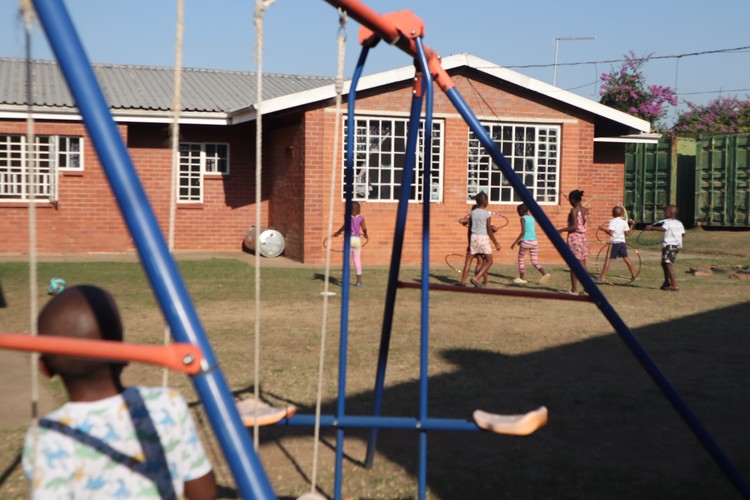
28 May 2024
Children playing at the Pietermaritzburg Child Youth Care Centre. Photo: Joseph Bracken
Organisations looking after children and elderly people in KwaZulu-Natal, which were already struggling to keep up as subsidies from the provincial Department of Social Development (DSD) lagged behind inflation, are now battling crippling funding cuts.
Funding for non-profit organisations by the department increased steadily from R629-million in 2020-21 to R755-million in 2022-23. Most of the increases came from a transfer of funds from the “goods and services” budget to the budget for non-profit organisations, according to the 2024/2025 KZN DSD budget breakdown. The department said this was used to “correctly classify the budget for salaries of Social Workers and Child and Youth Care Workers”.
But then, in the 2023-24 budget, the funding for the organisations dropped dramatically to R695-million.
Even before the cut, organisations looking after children and young people had been struggling to keep up because subsidies have not increased for four years. iCare, an organisation that looks after children who have lived on the street, has not received any increases to its childcare subsidy since 2019 when it was increased from R2,170 to R4,000 per child, said Anne Slatter, the centre’s director.
All organisations that receive funding from the provincial department and look after children are subsidised at R4,000 per child per month, said Graeme Wright, chief executive of Lily of the Valley Children’s Village and iKhethelo Children’s Village. Wright’s centres receive an additional subsidy of R3,547 per month for administration and R12,992 a month to pay the salary of a social worker.
Lily of the Valley Children’s Village receives a total of about R350,000 per month, for 85 children, and iKhethelo Children Village receives R195,000 per month, for 45 children. The two centres’ funding has not changed since 2020, said Wright, while food and petrol costs have doubled.
Funding from the DSD now covers only a third of the monthly costs, he says. For example, Lily of the Valley Children’s Village costs R1-million a month to run.
Fiona Balgobind, director of the Pietermaritzburg Child Youth Care Centre, said organisations working with children and young people have struggled to keep up with rising expenses as subsidies stagnate. “Each time there’s an increase in expenses, we have to put a lot more attention into securing more finances to survive and that takes us away from our core function of taking care of the children.”
According to the national DSD sector funding policy from 2020, the amount subsidised for each child was to have risen to R6,000 by 2022. In the policy, this amount is listed as a “minimum target”.
Mhlabunzima Memela, KZN DSD spokesperson, said that budget cuts had been implemented across government departments and not only to non-profit organisations. And the organisations had been consulted.
The cuts are to offset an increase in public sector employees pay, and reductions in funds from the National Treasury, according to the provincial department’s 2024-5 budget. The department also said in the budget that it would rationalise its funding to non-profit organisations to avoid duplication, and would investigate which services could be offered by the department directly.
None of the organisations GroundUp spoke to had seen any increase in subsidies for almost four years.
In 2016, Pietermaritzburg Child Youth Care Centre had the number of subsidies cut from 80 to 75 and then down to 72 in 2019, said Balgobind. In 2022 the KZN DSD told the centre they were “underperforming”, even though the DSD originally cut the numbers, and insisted the centre must start claiming again for 75 children.
Similar problems are reported by organisations caring for elderly people. Issy Geshen, an elderly care home, has also not received any increases in the subsidies per bed from the DSD in the last five years, said Sifiso Ngidi, the organisation’s administrator. “In fact we have enjoyed three increases in a total of ten years.”
Issy Geshen currently receives R3,000 per placement from the KZN DSD. Ngidi explained that even though they avoided a large budget cut this year they are still living “hand to mouth”.
Some months the organisation can only pay certain creditors, usually choosing the most important such as food, groceries and fuel for transportation. With about two thirds of residents requiring diapers several times a day, adult diapers are a huge cost not covered by the DSD. The centre also relies heavily on donations to help with expenses such as water and electricity.
The DSD does not determine how many beds the elderly care homes can have, but only subsidise a certain amount for each organisation. This means that a certain number of beds will go unsubsidised. “For example, we may have a facility which has 12 people but DSD only subsidises four beds”, said Femada Shamam, chief executive of The Association for the Aged (TAFTA).
The cheapest frail care cost is R13,490 a month at TAFTA. With the subsidy from the DSD, there is still a shortfall of about R8,500 per bed, said Shamam. If the bed is unsubsidised it is up to the resident, their family or the organisation to pay for the full cost.
TAFTA also provides community-based centres for elderly people. The centres have programmed activities and a meal. These are subsidised at R17.85 per person per day, but the number of days has been cut from 251 to 150 as TAFTA’s funding from the department has been cut by 6%, said Shamam. TAFTA provides care and support to approximately 5,500 older people.